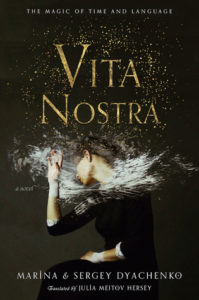
It’s hard to know where to start with Vita Nostra. The 2007 novel by Marina and Sergey Dyachenko was brought to the English market with a 2018 translation by Julia Meitov Hersey, and the dark magic school novel came with a solid wave of rave reviews. But unlike the last magic school novel I read, this one is about as far from Harry Potter as you can imagine. While there are coming-of-age elements, this doesn’t read like young adult literature at all—it reminds me more of Jeff VanderMeer’s work than of any other magic school novel I’ve read. I don’t have extensive experience with New Weird, but Vita Nostra feels like it could at least be a cousin.
This is not a book that lends itself to an easy plot summary, but we start with Sasha, our teenage heroine, being manipulated by a mysterious stranger into reorganizing her life so as to put her on a collision course with an obscure rural institute of higher learning. The novel follows Sasha through the end of high school and the first stage of her university career, as things go from odd and creepy to outright mind-bending.
It’s clear from the beginning that Vita Nostra’s version of magic school isn’t going to be fun and games. The tactics used to push Sasha into enrolling in the first place are cruel, and they don’t lighten up once she’s there, with the school leadership coming across as entirely unconcerned with ordinary concepts of morality. When combined with their unwillingness to explain much of anything, it lends the story a dark and mysterious atmosphere that carries the story in the early going.
As the novel progresses, it becomes clear that Sasha’s story will not be intricately plotted, with twists and turns along the way, but rather dropping a girl into the ineffable and seeing how she responds. There are no spellbooks here, there are pages and pages of gibberish than must be memorized and mental exercises unthinkable to the ordinary human reader. There’s no comprehensive or comprehensible magic system. In fact, the Dyachenkos go to great lengths to make it as incomprehensible as possible. And, while I have been critical in the past of intentional obfuscation on the part of the author in order to make a hero seem smarter, that’s not the goal here, and it works. The reader’s confusion adds to the atmosphere and helps us relate to the heroine—we are as lost as Sasha when she begins her schooling. As she grows in her abilities, the reader does not, and so we see her progress as though from increasing distance as she becomes more powerful and less. . . human.
It’s very difficult to put a number rating on a book like this, because it’s more about how it’s experienced than it is about certain plot points landing well or badly. Of course, I judge all books to some extent on how they hit for me, but it’s usually easier to explain what worked and what didn’t. This is a weird one. The atmosphere is strong, the main character is interesting, and she stays interesting even as she becomes less understandable. I found it to be a very good read, and I would recommend it, but it’s far from fantasy standard, and it won’t hit for everyone.
Recommend if you like: atmosphere, coming-of-age stories that lean on the literary side, weird fantasy.
Overall rating: 16 of Tar Vol’s 20. Four stars on Goodreads.
